- Home
- Chris Wraight
Valdor: Birth of the Imperium Page 3
Valdor: Birth of the Imperium Read online
Page 3
She stomped into the antechamber, where her aide-de-camp, Armina, was wrestling with a pile of comm-tubes freshly despatched by a messenger drone.
‘I’m running late,’ Kandawire announced.
Armina looked up at her, brushing away a strand of hair.
Kandawire was as black as jet, Armina was as white as chalk. Kandawire’s hair was wiry and unruly, Armina’s was straw-pale and flat. The two of them were like the termini of a spectrum illustration – the full range of humanity, its vigorous extremes, still popping up after tangled millennia of mingled breeding.
‘He will expect you to be on time,’ Armina said, sniffing in disapproval.
Kandawire went over to a sideboard and reached for a jewellery casket. ‘You have no appreciation for status, Armina,’ she said. ‘What signal would it send, if I turned up in the slot he’d offered me?’ She picked out a silver necklace, studded with tiny pearls, lifting it up to the light. ‘I’m a bloody High Lord. I turn up when I want to.’
Armina shook her head. ‘You could wear it a little more lightly.’
Kandawire turned, holding the necklace up to her throat. ‘Really? I like it.’
‘Your office.’ Armina went back to sorting the comm-tubes, extracting the ciphered innards and placing them in the correct order into the speaker-coils. ‘This bravado fools only fools. He’d only have to flick his fingers,’ Armina snapped her own, ‘and that would be your neck, gone.’
‘He’d not dare,’ said Kandawire, unclasping the chain and donning it. ‘There’s more than one kind of strength, something I keep telling you.’
‘Over and over,’ Armina mumbled.
‘The law binds them,’ Kandawire went on. ‘That’s what makes this Emperor worth serving.’ The clasp clicked closed, and she let her hands fall again. ‘At least, that is what we must believe.’
‘Will you at least make the attempt not to insult him?’
Kandawire tilted a mirror and adjusted her scarf and wrapped dress. ‘He is a Custodian. They are, so I have always been led to believe, impervious to insults. We are like gnats to them. Less than gnats – our bites don’t penetrate their skin.’
Armina put the last tube into the last coil. ‘There is much to do here,’ she said, chidingly. ‘You have been away for a long time already, working on… whatever it is. You have responsibilities, High Lord.’
Kandawire came up to her, took both her hands in her own. ‘I know. That is why I do this. Keep putting things in order for me.’
Armina smiled. ‘So you can disarrange them again.’
‘That’s my job.’
Armina pulled her hands away, and returned to the coils. Her fingers danced over the controls, and sigils began to pulse into the decoders. ‘At least, then, be careful,’ she said.
‘Ensure you retain contact with Ophar,’ said Kandawire, walking towards the great doors. ‘If you wish to worry about anyone, worry about him. I, on the other hand, as always, will be fine.’
That was not strictly accurate. For most of her life, Uwoma Kandawire had been very far from fine. It had been a vanishingly rare thing, on Terra, for anyone at all to be fine. In close and living memory, the entire planet had been a gangster-riddled rock, squabbled over only by the amoral and the debauched. Every part of it had been backward and dangerous, and staying alive had been a matter of luck, or maybe deviousness, or maybe, just now and then, judgement.
She had been born into a relatively wealthy family within what had then been the Banda Confederacy in the extreme south-eastern corner of Afrik. Modest wealth allowed them certain privileges – security guards around the edge of their compound, a degree of regularity in food supply, access to what few trappings of civilisation still clung on along the baked-dry coastal belt.
She still remembered, as a young girl, sitting on the deserted beach in the evening, the sand dirty, the desiccated old ocean-bowl just a few metres from her gritty bare feet. Flickers of distant lightning had been dancing along an infinite horizon. Those living nearby had called the ocean, while it had existed, zothasa – endless, as if it never found another shore.
Kandawire knew better. There were a few vid-books in her mother’s library, and one of those contained an atlas. The lithcast unit had broken a long time ago, but you could still shine a torch through the aperture and project the blurred trace of the coastlines onto a whitewashed wall. Once she’d learned that trick, she’d spent hours marking them out, trying to read the tiny labels and wondering what kinds of people lived in those places that she would never be able to visit. She imagined them all, naturally, as being much like her. Maybe many of them were wise and cultivated, living in cities lined with orange groves and water fountains. Or maybe most were like the zooipa, the savages of the north with their red-painted trucks and flame-bringers, who lived in hovels, ate human flesh for sustenance and raided for what little else they wanted.
She remembered sitting by the thin bars of the electro-heater in the evenings, her dress itchy from the dust, as her father traced his own bony finger along the burned-stick marks she had made on the wall.
‘You could once travel from here to here,’ he had said, jabbing at islands and inlets running up the eastern seaboard. ‘There were cities this far up, once. Huge, huge places, built on concrete platforms, out into the sea. They sucked the water up, like you suck goat’s milk through a straw, and scrubbed the salt from it. That was the only way they could keep the people from dying of thirst.’
‘What do they do now?’ she had asked, wide-eyed, chewing on her fingernails.
‘I do not know,’ her father had said. ‘Nothing works much, any more. Perhaps the zooipa raided there, like they did everywhere else. I expect those cities are empty, now.’
That had made her angry. All such stories had made her angry. ‘Why does nothing work any more?’ she had demanded.
She still remembered her father’s stubbly chin, his face that was skinny from not getting enough to eat, and those sad, intelligent eyes. ‘Because the warrior is in charge, kondedwa. Whenever the warrior is in charge, things stop working. For things to work, the warrior is the servant of the worker. You see it? The worker makes things work.’
‘The warrior makes…’
‘Wars.’
But the warriors were the only ones who made anything, back then. They were the only ones with the weapons, with the coin, with the energy. Nothing could stand in their way for long – when the mood came upon them, as it did often, they would ravage down the long, dry coast, burning and breaking. The sand would darken with blood for a few days, and the red earth would grow sticky with engine oil, and no one would sit under the shadow of the splintered palms and gaze out over the empty sea.
Now, when Kandawire thought back, she wondered that she had survived at all. Her mother had not, dying of the cancer that was now easily treatable in major Imperial cities – a result, Kandawire found out later, of the radiation-laced munitions still lurking in the grit of her homeland. Her father did not either; the raids eventually reached far enough south to swallow up the family compound, just as they had done to so many others, snuffing out the few bright points of sanctuary along that desolate littoral.
It had been Ophar who had rescued her. Ophar, with his spindly limbs and bulging eyes. Ophar looked like a child’s rag-toy, which was why no one took him seriously. He had pulled her from her cot and tried to huddle her out to the last of the land-transports before the zooipa broke through the perimeter. Precocious as ever, she had not let him drag her to safety, but had stamped her feet and refused to go until he had rescued the vid-book projector too.
She had not gone back for her father. She had not gone back for any of the staff who had nursed and entertained her. Back then, with a spoiled child’s sense of self-importance, she had wanted the one thing that made her happy, that allowed her to dream of other worlds and other places.
&n
bsp; Kandawire still winced at the memory. It had haunted her ever since, spiking at her conscience. She could have done nothing much to help, in all honesty, but still it rankled that she had never tried. All she had left now were those memories, those injunctions.
The worker makes things work.
Now, in the high airs above the Palace’s central zone within her luxurious air-car, Kandawire looked over at the pilot of the flyer, with her starched collar and trim epaulettes. She glanced at the guards on either side of her, a man and a woman, both in the heavy chainmail armour that gave her that elusive sense of physical security. They performed their duties with a quiet attention to detail that reflected well, not only on them, but on the system that had created them. Kandawire could raise her pudgy, ring-encrusted finger, and they would follow any order she gave them.
The warrior is the servant of the worker.
So fragile, that arrangement. So easy to pull apart.
‘Bring us down on the minor platform, please,’ Kandawire said.
The pilot nodded, and the air-car dipped into a controlled descent. Ahead of them, the skeleton of Third Proscribed Area, known by anyone with any decent information as the Tower of Hegemon, filled the forward viewscreens. It looked like some heavy outer shielding was being lifted into position, obscuring a thick core of rockcrete piles. The topmost pinnacle was like a finger flayed of its flesh, a needle of bone against the white sky.
They docked at the lesser of the two air-platforms, to be greeted by a welcome party of Tower serfs. As ever, they were polite, soft-spoken, with eyes that seemed to see right through you. The passage to the captain-general’s private chambers was efficient and quick, laced with expert small talk. The one who accompanied her, a slim woman with amber-brown skin called Callix, had the polished air of an aristocrat, or perhaps an academic, or maybe an archaeologist. She asked courteous questions, gave semi-contentful answers and smiled coolly the whole time.
It was so hard not to hate those people.
Soon they were all gone, along with Kandawire’s bodyguards, leaving her alone in a marble-floored chamber of white stone walls. Late afternoon sun filtered in through narrow windows, designed to look like enlarged arrow-slits. The architecture was monolithic, like some fortress or castle from the forgotten past. There were no pictures, no ornaments, no fountains or decorative plants. The entire space was cold, pale, flat and unreflective.
Set in the heart of the floor, before the largest set of windows, were two seats facing one another. The one on the left was of human dimensions, and stood empty. The one on the right was twice the size, and was occupied.
‘Sit, please,’ its owner said, gesturing to the empty space.
Before she knew what she was doing, Kandawire found herself complying. Then she looked up, and faced, for the first time ever at such close range, the object of her enquiries: Valdor, the Emperor’s Spear.
It was impossible, even for her, not to feel a spike of fear. It was impossible not to sense the cold sweat rising, the fight-or-flight mechanism kick in, the desire to look away, to reach for something to defend herself with.
With effort, she met his gaze.
‘A good journey?’ he asked.
It would have been nice to have replied with something clever, or defiant – something fitting her high station. In the event, she found her mouth had gone strangely dry.
‘Yes,’ was all she could get out.
At least, though, it was begun now. She had been told it would never happen, that he would never agree, and that it would be a waste of her time, since nothing could be discovered from this source that he did not wish to be discovered.
They had all been wrong about the first of those. Hopefully they would be wrong about the rest, too.
She took a breath.
‘Constantin Valdor, captain-general of the Legio Custodes,’ she said, trying to keep her voice level. ‘By the authority vested in me by the High Council of Terra, I hereby place you under a state of formal enquiry. By statute of the Lex Pacifica, you are required to answer all and any of my questions. An audex transcript will be made available in due course. Do you have any queries, before we begin?’
He was so like the rest of them – so calm, so icily assured. She wondered then if anything, ever, had given him a reason to break a sweat, or to lose that magisterial air of total command. This was a farce. He could end it at any time, and there was nothing she could do. She wondered, her heart thudding, if Armina was right, and this whole charade was little more than a signature over her death warrant.
But she had to keep going, now. It had been started, and must now be finished.
‘None at all, High Lord,’ Valdor said, placing his hands lightly on his lap. ‘I suggest we commence. So, what do you wish to know?’
Four
Ophar was uncomfortable in his uniform. He was uncomfortable in most uniforms, and most clothes, and had come to accept that his physical dimensions meant that he probably always would be.
He had been gangly since birth, possessed of limbs that constantly seemed to be trying to make their own way in the world. Now he was old, too. He was older than he’d ever expected to be, his life extended by the treatments available in this terrifying, exciting new world of possibility. He didn’t even know exactly how old he was, since the earliest years in the Banda settlements had been chaotic and violent, but he knew that, had he not left when he did, he would not still be irritably reflecting on ill-fitting clothes, or on anything at all.
Occasionally he would ponder this strange turn of events, when his duties allowed him. He could still experience a powerful sense of shock at the pace at which everything had changed. Sometimes, but not often, he would miss the old world, with its suffocating heat and variety, its sense of danger and its essential fragility. The new reality was an austere place, already obsessed with laws and regulations. More scholars had come to Himalazia, they reckoned, than warriors. Already the Palace was struggling to feed itself, importing much of what it consumed from lowlands far away. That trend, Ophar thought, could only continue. It was, after all, a ludicrous place to build a city.
Still, this was where Uwoma had chosen to come, and where Uwoma went, so did he. That was the one constant – something to cling on to even as the planet around was reshaped and rebuilt into new and dizzying forms.
This uniform was particularly scratchy. It had taken a while to put together, he remembered, and they had struggled to get the details right. Most officials in the rapidly growing bureaucracy – which they were already beginning to call, with absurd pomposity, the Adeptus Terra – seemed to source their robes from bafflingly obscure places, buried under levels of cipher-protected security and knowledge-keys. That was not altogether surprising, since the positions themselves were now prized targets, offering a route out of poverty for the gifted and the well connected. A life of relative drudgery in an archive or a cogitator-depot was far more attractive than the windswept alternatives, and so competition was fierce and privileges jealously guarded.
Uwoma was a powerful woman now, though, and so the right palms were greased and the right passes obtained. Ophar passed for a senior Administratum Prefectus pretty well. He even had a fake augmetic eyepiece, which gave him a nasty rash but rounded out the effect to satisfaction.
It was astonishing, he always found, the degree to which such flimsy things gave him passage to all sorts of places. Armina had kitted him out with a brace of stolen ident-pulses and lockwords, but he rarely needed to use them. Just the sight of his uniform – wine-red robes and hood, ivory chasuble, the eagle’s-head-and-lightning sigil stitched in gold thread above the right breast – was enough for most purposes.
The people were already learning deference, Ophar noted. They were forgetting the anarchy, and reverting to the long-run, servile type. Commands rarely needed to be enforced, here – they were taken on enthusiastically, drunk in by a
populace who still remembered the alternatives.
It was understandable, though hard to admire. He remembered the brine smell of the gasping salt pans, and the burning engine oil over the hot plains, and missed the old place more than ever.
Now everything was cold. He shivered as he walked, not hurrying, not tarrying, adopting the scholar-shuffle that the rest did. He passed through crowds of them, all doing the same, carrying bundles of paper or heaps of message-tubes. Every chamber smelled new, and most were still filmed with the dust of construction. Galleries had been delved far into the rock heart of the peaks, now heated by great geothermal shafts, but it never seemed enough to keep the air from chilling; and in any case Ophar’s circuit took him high up, out onto the walls where the gales were always biting.
The recent round of observations had taken him three days. He’d ensured that his route altered every time, always keeping out of eyeline with the Inner Walls unless he was in position to take a reading. The equipment he’d been given was good – he could record several hundred picts on a single circuit, all blink-controlled and then double cipher-interred within the augmetic eyepiece.
Two nights ago he’d spent a long time out on the western redoubt, huddled down against a semi-built inner parapet, with a perfect vantage on the Sanctum Imperialis and the heavy works in the intervening valleys. His augmetic had whirred, his cogitated plan-overlays had recalculated. It had been a precious moment, one in which he picked up a good slug of data to be analysed later.
He saw them, up on the ramparts, heading away, one by one. Golden warriors, plumed with crimson, just tiny dots in the distance and part-hazed by the dust in the air. They were already the symbols of the place, its guardians, the ‘custodians’, not just of the Palace, but the Imperium itself. No one knew how many there were, not even Uwoma. That was for him to find out, of course, though the results were already beginning to surprise him.

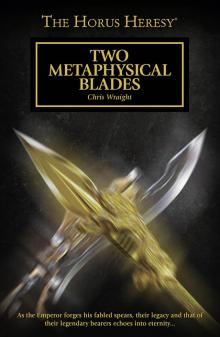 Two Metaphysical Blades
Two Metaphysical Blades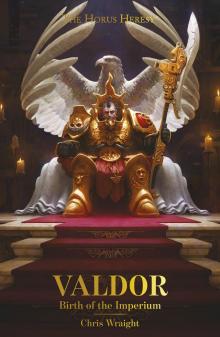 Valdor: Birth of the Imperium
Valdor: Birth of the Imperium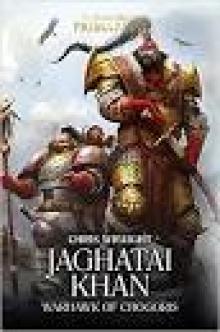 JAGHATAI KHAN WARHAWK OF CHOGORIS
JAGHATAI KHAN WARHAWK OF CHOGORIS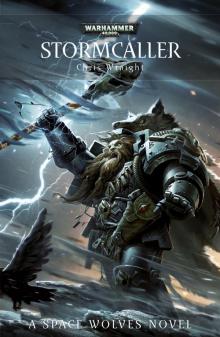 Stormcaller
Stormcaller Child of Chaos
Child of Chaos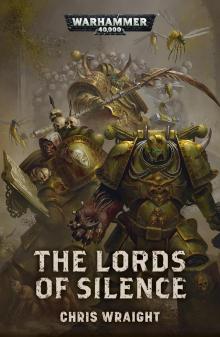 The Lords of Silence
The Lords of Silence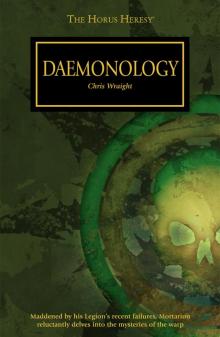 Daemonology
Daemonology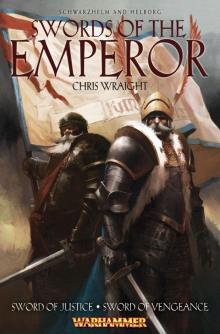 Swords of the Emperor
Swords of the Emperor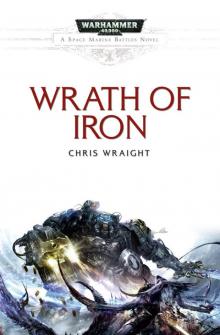 Wrath of Iron
Wrath of Iron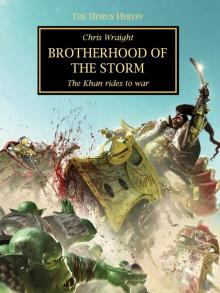 Brothers of the Storm
Brothers of the Storm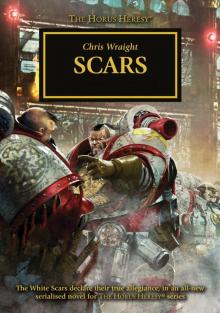 Horus Heresy: Scars
Horus Heresy: Scars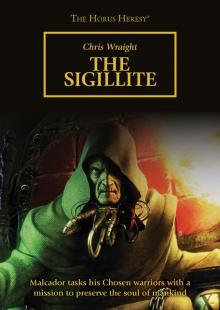 The Sigillite
The Sigillite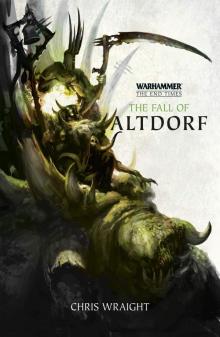 The End Times | The Fall of Altdorf
The End Times | The Fall of Altdorf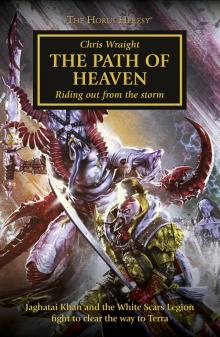 The Path of Heaven
The Path of Heaven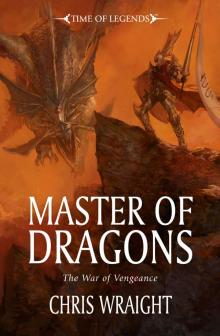 Master of Dragons
Master of Dragons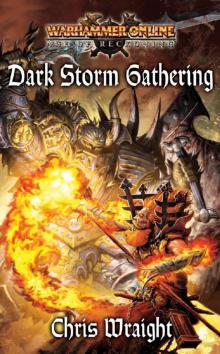 WH-Warhammer Online-Age of Reckoning 02(R)-Dark Storm Gathering
WH-Warhammer Online-Age of Reckoning 02(R)-Dark Storm Gathering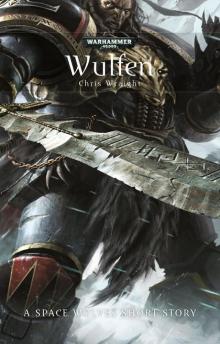 Wulfen
Wulfen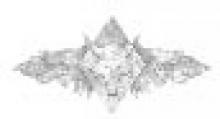 Battle Of The Fang
Battle Of The Fang Onyx
Onyx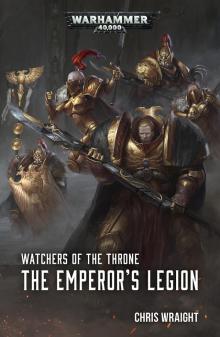 Watchers of the Throne: The Emperor’s Legion
Watchers of the Throne: The Emperor’s Legion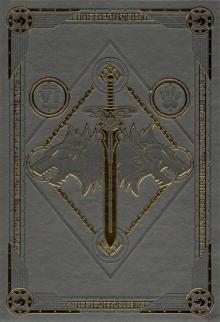 Leman Russ: The Great Wolf
Leman Russ: The Great Wolf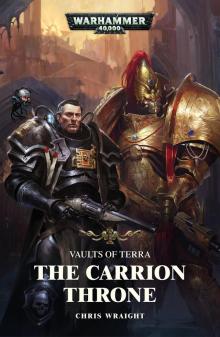 Vaults of Terra: The Carrion Throne
Vaults of Terra: The Carrion Throne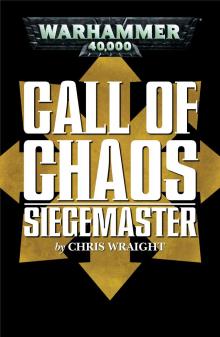 Siegemaster
Siegemaster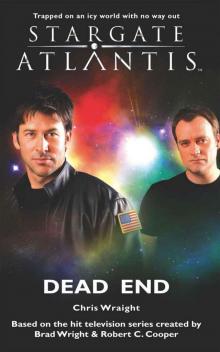 STARGATE ATLANTIS: Dead End
STARGATE ATLANTIS: Dead End Scars
Scars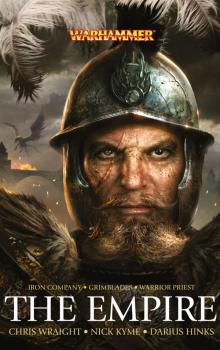 The Empire Omnibus
The Empire Omnibus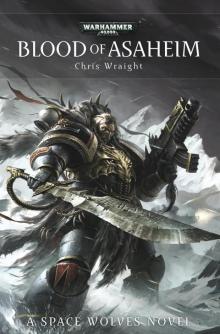 Blood of Asaheim
Blood of Asaheim